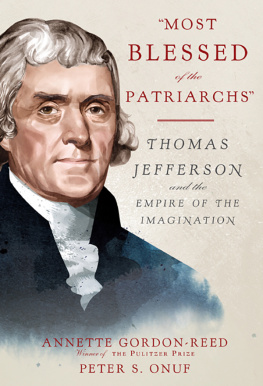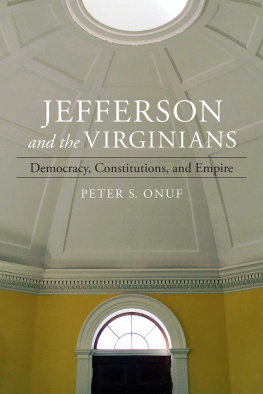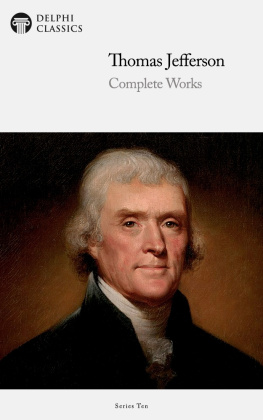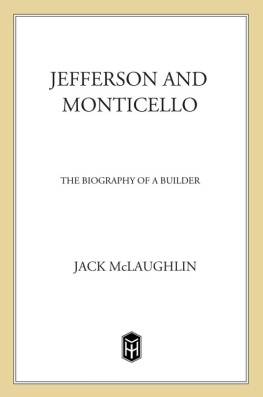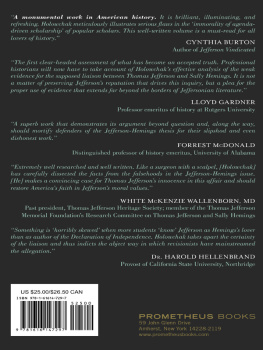


FOR LUCIA (CINDER) STANTON
T homas Jeffersons indebtedness to his family is a major theme of our book, and we happily acknowledge our debts to our own families: to Annettes husband, Hon. Robert R. Reed, and her children, Susan and Gordon; and to Peters wife, Kristin K. Onuf, and his daughters, Rachel and Alexandra. They have lived with this project and our focus on Jefferson and Monticello for many years now, and we are grateful for their love, support, and patience. Jefferson has attracted a diverse and growing community of scholars from around the world, most of whom have spent time at the Robert H. Smith International Center for Jefferson Studies at Monticello (ICJS)and many have become our good friends. We salute Andrew Jackson OShaughnessy, the Saunders Director of the ICJS, for his extraordinary hospitality and unfailing good humor, at home in Charlottesville and in conference venues across the globe.
We thank our editor, Robert Weil, for his meticulous attention to the manuscript and enthusiasm, along with others at Liveright, including Bobs assistant, Will Menaker, who helped bring this project to fruition. We were thunderstruck to learn when we handed in our manuscript that the poet we used to help sum up Jeffersons personality, Fernando Pessoa, is the subject of a biography that Bob is editing. This shows the degree to which our minds have met on the question of what types of people in history merit our sustained attention. Faith Childs, our agent, has our thanks for her belief in this project, her insights, her good humor, and support. We would also like to thank Otto Sonntag, who suggested helpful changes to the text for clarity, and worked through our endless revisions with aplomb. We express our deep gratitude to Amanda Cegielski, faculty assistant extraordinaire at Harvard Law School, who helped us both keep on track.
This book was among the projects that one of us (Annette) worked on under the auspices of fellowships from the Dorothy and Lewis B. Cullman Center for Scholars and Writers, the John Simon Guggenheim Memorial Foundation, the Radcliffe Institute for Advanced Study, and with the support of faculty research grants from Harvard Law School.
Finally, our debts to the scholarship of fellow Jeffersonians are apparent and noted in appropriate places in the preceding pages. We particularly thank our friends Christa Dierksheide, research historian at the ICJS, and Francis D. Cogliano, professor of history at the University of Edinburgh, for their careful reading of the entire manuscript and their helpful comments. This book is dedicated to Lucia (Cinder) Stanton, the Shannon Senior Historian Emeritus at Monticello. Cinders pathbreaking work on Jefferson and the people he enslaved have helped to shape our understanding of the most blessed of the patriarchs. It is no coincidence that our book and hers, Those Who Labor for My Happiness: Slavery at Thomas Jeffersons Monticello (2012), draw their titles from the letter Jefferson wrote to Angelica Schuyler Church on November 27, 1793.
OTHER BOOKS BY ANNETTE GORDON-REED
Andrew Johnson
(The American Presidents Series)
The Hemingses of Monticello: An American Family
Vernon Can Read!: A Memoir
(with Vernon E. Jordan Jr.)
Race on Trial: Law and Justice in American History
(editor)
Thomas Jefferson and Sally Hemings: An American Controversy
OTHER BOOKS BY PETER S. ONUF
The Mind of Thomas Jefferson
Nations, Markets, and War: Modern History and the American Civil War
(with Nicholas G. Onuf)
The Revolution of 1800: Democracy, Race, and the New Republic
(edited with James Horn and Jan Ellen Lewis)
Jeffersons Empire: The Language of American Nationhood
Jeffersonian America
(with Leonard J. Sadosky)
Sally Hemings and Thomas Jefferson: History, Memory, and Civic Culture
(edited with Jan Ellen Lewis)
All Over the Map: Rethinking American Regions
(with Edward L. Ayers, Patricia Nelson Limerick, and Stephen Nissenbaum)
Jeffersonian Legacies
(editor)
Federal Union, Modern World: The Law of Nations in an Age of Revolutions,
17761814
(with Nicholas G. Onuf)
A Union of Interests: Political and Economic Thought in Revolutionary America
(with Cathy D. Matson)
The Midwest and the Nation: Rethinking the History of an American Region
(with Andrew R. L. Cayton)
Statehood and Union: A History of the Northwest Ordinance
The Origins of the Federal Republic: Jurisdictional Controversies in the United
States, 17751787
ABOUT THE AUTHORS
ANNETTE GORDON-REED is the author of the National Book Award and Pulitzer Prizewinning The Hemingses of Monticello: An American Family and is the Charles Warren Professor of American Legal History at Harvard Law School, Professor of History in the Faculty of Arts and Sciences at Harvard University, and the Carol K. Pforzeheimer Professor at the Radcliffe Institute for Advanced Study. She lives in New York City and Cambridge, Massachusetts.
PETER S. ONUF is the Thomas Jefferson Foundation Professor of History Emeritus at the University of Virginia and Senior Research Fellow at the Robert H. Smith International Center for Jefferson Studies at Monticello. Winner of the American Historical Associations Nancy Lyman Roelker Mentorship Award in 2012, Onuf is cohost with Ed Ayers and Brian Balogh of the popular public radio program BackStory with the American History Guys. He lives in Portland and Winter Harbor, Maine.
I n late autumn of 1793, Secretary of State Thomas Jefferson was in Germantown, Pennsylvania, then the nations temporary capital. A devastating outbreak of yellow fever had driven the government, including President George Washington, out of the capital, Philadelphia, to escape the horrific epidemic, whose origin was a mystery to all. Jefferson had not, in fact, been a part of the exodus. He had decided to leave Philadelphia in the winter of 1792, well before the outbreak. Perhaps he had grown weary of city living or, more likely, wished to find respite from the scene of his metaphorical death match with Secretary of the Treasury Alexander Hamilton, his chief rival in Washingtons cabinet. The two men had very different visions about the way the new country should progress, and Washington sided with Hamilton.
Jefferson had taken residence in a house along the Schuylkill River in April. After a brief sojourn at his home, Monticello, he moved to Germantown knowing that he was in his final days in the administration. When he lost the battle with Hamilton, he gave notice of his decision to resign his post. After some difficulties obtaining lodging in the town newly crowded with refugees, he was able to find a home. It was from this place, and against this backdrop of troubled and disorienting times, that Jefferson wrote to his friend Angelica Schuyler Church in the waning days of November.
Jefferson and Church had first met in Paris on the eve of revolution, while he was serving as minister to France. When he wrote to her from Germantown, she was still in London, but she had written to him of her impending return to America and with news of mutual friends they had known there. The marquis de Lafayette had been jailed (which Jefferson knew). Madame de Corny, who ran a salon that Jefferson often frequented, had lost her fortune. Maria Cosway, with whom Jefferson had had some sort of dalliance, had entered a convent. Jefferson reassured Church that efforts were being made on Lafayettes behalf. He lamented Madame de Cornys economic downfall and expressed surprise at the sharply religious turn in Cosways life. And then Jeffersons love of language took flight:
Next page
